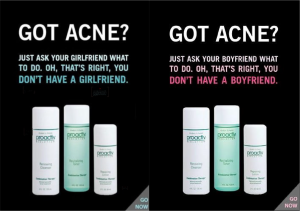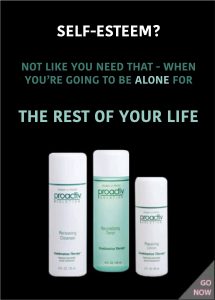
Analysis of the Advertisement
I chose this advertisement because it hits close to home. Not only have I struggled with acne all my life, even until now, but I’ve also been a former Proactiv consumer. This advertisement is capitalizing on the insecurities of people in a very disturbing and inappropriate way – especially teenagers and young adults who are learning to be confident and developing their self-esteem. Why should a common skin condition be problematized negatively? Acne is the most common skin concern in North America, let alone the entire world. Not only does it affect over 50 million North Americans but 95 per cent of all people will experience acne at some point in their lives. As someone with first-hand experience, it is safe to say that the stigma around acne and those who struggle with it takes a huge toll on one’s mental health. In recent years, there’s been a lot of positivity and movements around people’s body image – a push to change cultural perceptions of beauty and health. This advertisement specifically targets people’s vulnerability. Proactiv is leveraging consumers’ emotions and how personable the ad is. Skincare companies aren’t only profiting from people’s insecurities, but it is evident that they are also the ones creating the insecurity. Proactiv is a company that was first introduced in the mid-90s. The main target markets are teenagers and young adults through regular TV commercials and ad placements in magazines. Ads like this are implying the idea that the sole reason for being single is due to acne, especially when it is evident to be targeting heterosexual young women with the use of pink text. It is magnifying the idea and emotions a girl or guy may already be experiencing due to acne. I can admit that this is exactly how I felt as a teenager.

Explanation of my Jammming Recreation
I recreated the Proactiv advertisement by blending the ads, i.e. making one applicable to everyone as the original ad comes off heteronormative. I changed the original slogan completely and rewrote it in the most direct way. “Got Acne” is replaced by “Self-esteem” because the goal that is being achieved by these skincare companies is to make the consumer relate to the emotions that already exist. In this case, our physical appearance is tied to the outcome of relationships in our lives, no matter your sexual orientation. On a deeper level, it is how our image reflects our unconfidence. As people, we judge ourselves more than others do and this is exactly what this ad is taking advantage of. The issue I’m trying to magnify is that regardless of whether you’re male or female, everyone has insecurities about their appearance, thus it should not be generalized. Historically speaking, women have played a bigger role in being “perfectionist” and upholding images to fulfill the expectations of others. I believe it goes both ways as men grow a bigger ego and find validation through being validated by people who find them attractive. The role both genders play in each other’s lives is evident in how they find approval for themselves. I believe the collective culture we are working towards is one where these concerns could be promoted in an uplifting way instead of problematized and looked down on. This makes it seem that those with this trait are seen as the lowest of the food chain. Instead of feeding on the profits made through bullying, companies like Proactiv would be succeeding if they chose to impact positively. I would have recreated this ad to say: “You study hard, you work hard and you train hard. Now take control of your skin – Progressively”. We don’t achieve success overnight and realistically speaking these products won’t clear us up overnight either. Things always taster sweeter when we work for it. Consumers will also invest more if they can sense the light at the end of the tunnel. This is the power of marketing.
References
Ann, Lee, et al. “Acne By the Numbers: 9 Surprising Acne Statistics.” Acne By The Numbers: 9 Surprising Acne Statistics and Treatment Ideas [INFOGRAPHIC], https://blog.mariobadescu.com/acne-by-the-numbers-9-statistics-about-acne-infographic/.
Diply. “We Can’t Understand How These 28 Sexist Ads Were Ever Approved.” Diply, Diply, 28 July 2017, https://diply.com/11906/we-cant-understand-how-these-28-sexist-ads-were-ever-approved.
Relaxnews. “The Social Stigma Surrounding Acne Could Be Ruining the Well-Being for Sufferers.” CTVNews, CTV News, 1 Oct. 2018, https://www.ctvnews.ca/health/the-social-stigma-surrounding-acne-could-be-ruining-the-well-being-for-sufferers-1.4116676.